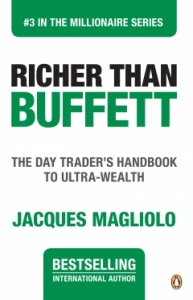
What do you hope to achieve with your series of books?
To hit home the very simple fact that trading in equities, futures or other securities is not a get-rich-quick scheme. It takes dedication, knowledge and discipline to succeed as a day trader.
How does Richer than Buffett differ from some of your other books? This book is a revised edition - what extra information is in Richer than Buffett that wasn't in the last edition?
Richer than Buffett has been completely updated and revised to make the book more current to the volatile and ruthlessness of trading in today’s global arena. The book is in a series, which takes the reader/trader through the various stages of establishing him/herself as an efficient and profitable trader. Each book gets progressively more complicated and expansive. Books written prior to Richer than Buffett concentrate on general market trends and traits, understanding terminology and equities. This book concentrates on trading techniques. Later books in the series look at global trading and selection strategies.
What makes this book different from other trading books available in stores now?
This book is different in that it stresses that fundamental analysis is as important as technical analysis. Essentially, a trader needs to have general strategies in place before they start trading. Many books look at trading techniques without portfolio strategy – Richer than Buffett looks at both. In addition, Richer than Buffett has important lists of questions to assist novice traders to establish themselves as traders. Too many books ignore the novice trader.
Tell us briefly - how can one can actually get richer than Buffett?
Patience and discipline in trading to a self-imposed strategy, which enables you to make more profits than losses. And to do this in incrementally larger amounts over time. Warren Buffett is a proponent of long-term investing. This book suggests that a trader needs to have a long-term investment strategy with short-term methods to take advantage of market anomalies.
For instance – investing in Sasol for the long term is highly profitable. The share rose from R234 in 2008 to a current high of R414. This is a 77% rise. However, a trader would have taken advantage of world volatility and sold the share three times (share hits new high levels) and bought back at lower levels. Such a trader would have made a profit of over 90%.
Why did you decide to call this book Richer than Buffett?
Stock brokers and traders around the world admire Buffett and his methodology of trading.
How did you start out in trading?
I started when I realised in 1999 that trading to sound fundamentals could prove successful. It has. Mentoring clients has shown this, with some tripling portfolios of over a million rand in a six-year period. This is despite the market crash of 2008/2009.
Can anyone, even those with no financial knowledge, become a day trader?
Yes. Anyone can, if they use the logical steps as outlined in the Millionaire series and, more specifically, this book.
Why would you advise that South Africans learn the art of trading?
The amount of pension/savings accumulated during one’s working lifetime is never enough to live off after retirement. Trading is a logical step to meeting one’s financial needs.
How can different trading styles get you rich or lose you lots of money?
Novices often believe that they can skip important (laborious) steps in establishing trading strategies. For example, you should always start with equities and, once you master that sphere of trading, move onto warrants or futures. South Africans often start with the much higher risk of futures trading and loose, because they simply are too rushed to make mega cash.
Remember that stockbroking and trading is carried out by highly skilled professions, who are controlled and measured in their approach to making money. Be patient and disciplined – then you will make money from trading.
What are your top tips for day traders?
Once you have established a broader strategy, stay within your own pre-determined and established set of rules. Never trade because you are bored. Don’t chase the market and stay within your sphere of knowledge, i.e. If you are skilled in trading equities, don’t risk your capital in futures. At least, not until you have gained sufficient knowledge in that securities industry.
Find out more about Richer than Buffett.
Find out more about Jacques Magliolo.






